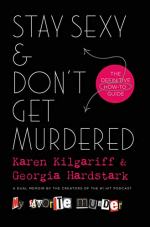|
This section contains 775 words (approx. 2 pages at 400 words per page) |

|
Stay Sexy & Don't Get Murdered Summary & Study Guide Description
Stay Sexy & Don't Get Murdered Summary & Study Guide includes comprehensive information and analysis to help you understand the book. This study guide contains the following sections:
This detailed literature summary also contains Topics for Discussion on Stay Sexy & Don't Get Murdered by Karen Kilgariff .
The following version of the book was used to create this study guide: Kilgariff, Karen and Hardstark, Georgia. Stay Sexy & Don't Get Murdered: The Definitive How-To Guide. Tom Doherty Associates, 2019. Amazon Kindle eBook.
Stay Sexy & Don't Get Murdered is a collection of essays on eight topics, with each author contributing one essay per topic. After Karen's introduction in which she outlines how she and Georgia came to write this book after the success of their true crime podcast, My Favourite Murder, the book begins with the first topic: “Fuck Politeness.” In this chapter, Karen and Georgia subvert the social convention that women have to be polite, subservient, and deferential, often to the detriment of their own personal safety or happiness. Georgia writes about an incident with a predatory man after which she now wishes she had been less polite and got herself out of that situation sooner. Karen writes about her mother as the epitome of "Fuck Politeness" and uses her as an example of how to go after the life you want.
In Chapter Two, Karen addresses the topic of self-care. She subverts the commodification and commercialization of self-care and argues for a two-pronged approach the includes close meaningful friendships and professional therapy. Georgia writes about her early teen years when she went through a drug addiction but eventually recovered with the help of Ray Bradbury's books. She tells the story of the day she traveled to hear Bradbury speak and got to meet him in person. Chapter Three is about the importance of having people to reach out to for help and support when one is struggling in life. Karen writes about her issues with alcohol and her struggles with her self-esteem in a beauty-obsessed culture. Georgia writes about her early teens when she would shoplift regularly, focusing on the time she was caught and turned to her father for help.
Chapter Four is about childhood. Georgia writes about her early interest in horror and true crime, interests which eventually formed the foundation of her friendship with Karen and resulted in the creation of their successful podcast. Karen provides insight into a typical afternoon and early evening during her childhood when she and her sister would be left to their own devices until their parents came home from work. In Chapter Five, Karen and Georgia write about mental health. Karen focuses on her previous issues with alcohol and drugs and how she came to realize that she needed to change those unhealthy habits. Georgia writes about the top ten insights she had gleaned from her time in therapy, debunking some misconceptions about professional therapy and encouraging readers to work on their mental health with a professional therapist as well.
In Chapter Six, Georgia and Karen both write about the various odd-jobs they had earlier in life before beginning their careers in the entertainment industry. Karen worked both jobs in which she was exploited and jobs in which she was not a good worker. Eventually, her hatred of her retail job helped to push her to pursue her career in comedy. Georgia remembers some of her past jobs with more fondness before writing about working in an office job that she found boring and uninspiring. This prompted her to start a blog as a creative outlet and her extracurricular creative pursuits eventually opened up more exciting and interesting career prospects for her. Chapter Seven is about the importance of being self-sufficient, as described through financial independence which contributes to the sense of accomplishment and self-esteem that comes from being able to provide for oneself.
Chapter Eight focuses on the theme of true crime that is the foundation of Georgia and Karen's podcast. Georgia writes about when her brother got lost in the woods and when she herself once stayed out all night, terrifying their family members. This prompts her to reflect on the fact that true crime needs to be treated with gravitas as the family members of the victims concerned are still living in that tragedy. Karen continues this argument by writing about how she and Georgia have handled discussions of true crime over the years. She focuses on the issue of victim-blaming, noting how she and Georgia have inadvertently been guilty of accidentally doing so in the past and calling for a change in how we think about and talk about violent crimes in our society.
Georgia's conclusion reflects on the community of true-crime fans that has been created in part through her podcast with Karen. She writes about the importance of vulnerability and community, noting the contributions that true crime aficionados have made to law enforcement and criminal justice.
Read more from the Study Guide
|
This section contains 775 words (approx. 2 pages at 400 words per page) |

|



